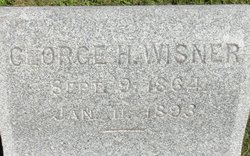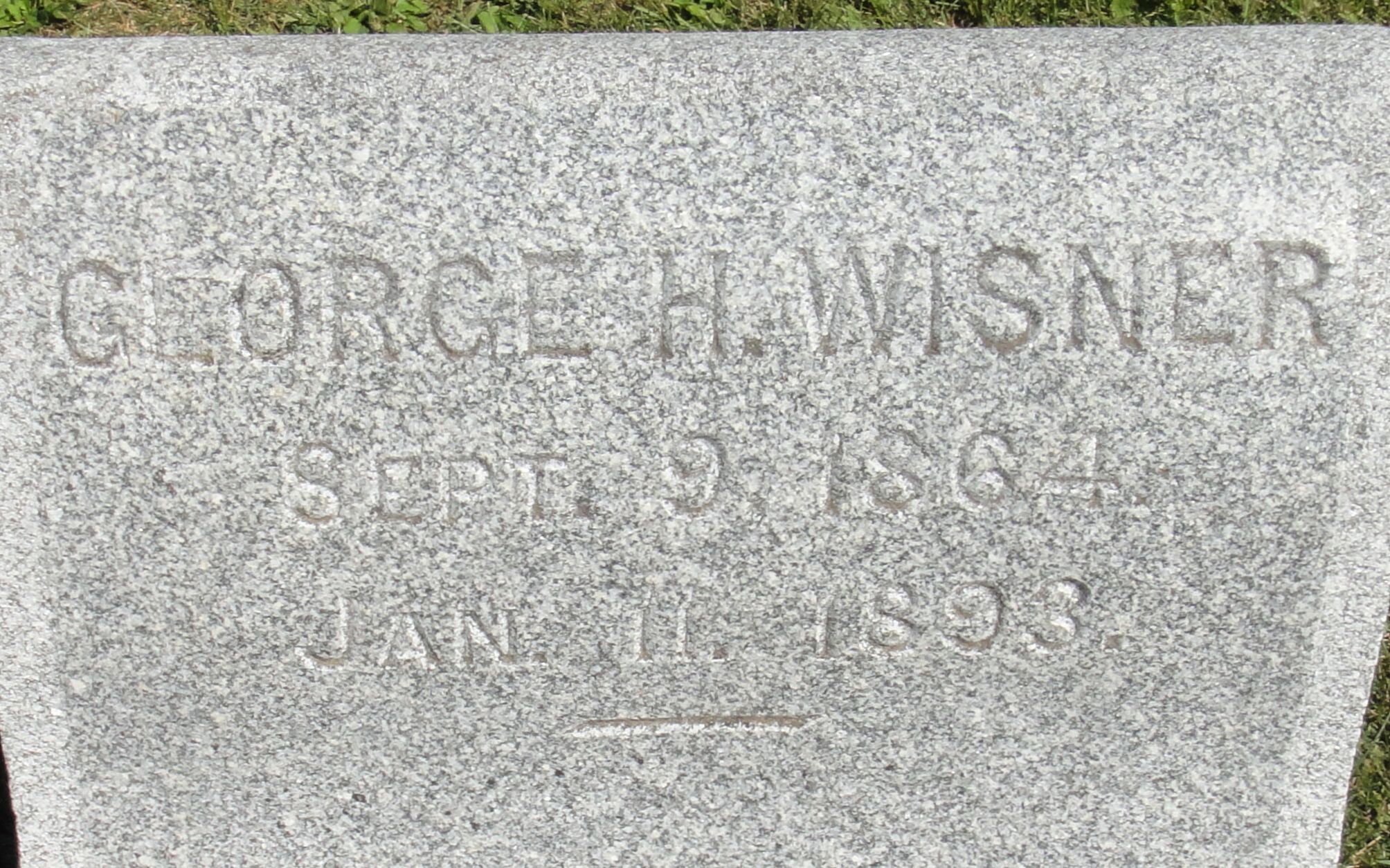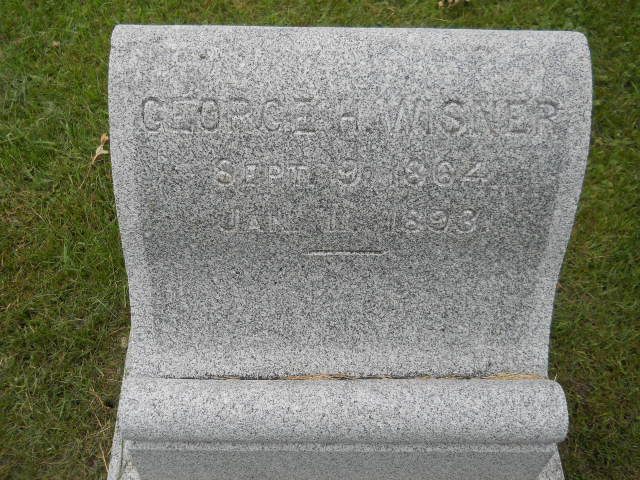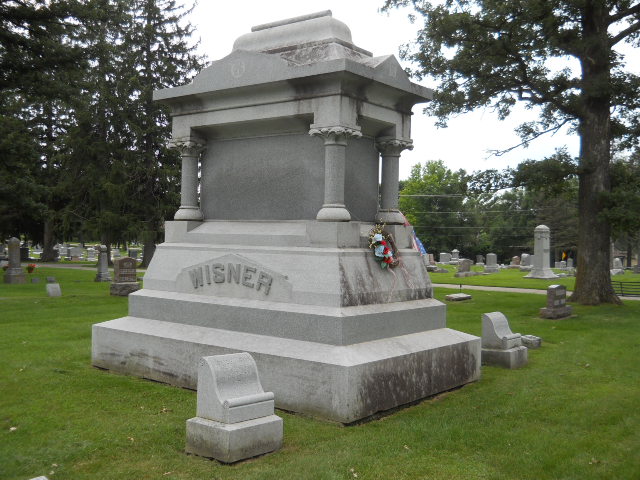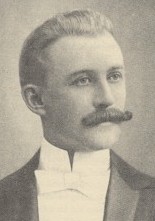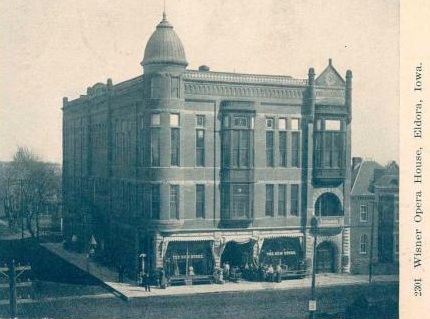George H. Wisner
Mr. Wisner, who for many years was one of Eldora's representative citizens, was born at Iowa Falls, Iowa September 9, 1864 and although his span of life was short he made his mark in an indelible manner, his death occurring at Eldora on January 11, 1893 at the age of twenty-eight years, four months and two days. He was the son of Lyman F. and Julia A. Wisner, the former dying on August 21, 1889. He was the only child and succeeded to two-thirds of his father's immense property, which made him the wealthiest man in central Iowa. He was a young man of rare business acumen, sagacity and foresight and at the time of his death he was President of the Hardin County Bank and Director of the First National Bank at Iowa Falls, the State Bank at Radcliffe and the State Bank at Ledyard, Kossuth County and he was fast taking his place in the business world as an enterprising, wide awake, prudent business man of keen discernment and during the three short years of his active business career he endeared himself to every citizen of Eldora and Hardin County by his enterprise, liberality and genial disposition, winning the confidence and good will of all with whom he came into contact. He was the life and moving spirit in every undertaking for the improvement of Eldora. The fine opera house which bears his name was completed at a cost of seventy-five thousand dollars.
Mr. Wisner came to Eldora when eleven years old and grew to manhood here. After a thorough preparation in the public schools he attended Shattuck Military Academy at Faribault, Minnesota, where he made a splendid record, graduating therefrom with the rank of Captain.
Fraternally Mr. Wisner was a member of St. Elmo Commandery, Knights of Pythias of Iowa Falls; of Evergreen Chapter and Montague Lodge of Eldora and a short time before his death he had been elected Commander of Wisner Division No. 7 and was a member of Evergreen Lodge No. 56, Knights of Pythias. He also belonged to Lodge No. 77, Independent Order of Odd Fellows and the Masons, belonging also to the Ancient Arabic Order of Nobles of the Mystic Shrine.
Although Mr. Wisner possessed great wealth, his generous and unaffected nature held every man as worthy of his esteem and friendly regard until forfeited by some unworthy action. The poor and humble were as free to approach him as the exalted and powerful and every one who knew him admired and loved him and when his untimely death occurred the whole central part of the state mourned him. He used his money for the benefit of the community. He was very liberal in his subscription to the courthouse fund. It was said during his life that he was worth a million dollars, but he was unassuming, plain, quiet and homespun as a common day laborer; he gauged men by what they were within themselves and not by their money or political power. He was a loving son, very devoted to his mother, willing to sacrifice anything, if need be, for her comfort and pleasure. He was also one of the best of husbands, having married on October 8, 1889 Fannie W. Gilman, daughter of Mr. and Mrs. C.C. Gilman, a prominent and influential family of Eldora. Mrs. Wisner is a lady of culture and refinement and has long been a social favorite is this city and community. This union was graced by the birth of two bright and interesting children, Gilman H. and Lois Julia.
It is worthy of note that while the opera house, mentioned above, was in course of construction, a friend said to Mr. Wisner, addressing him by his first name by which he was familiarly known: George, some of your friends think you are not going to receive a very large per cent on this investment of yours. Mr. Wisner's face lit up with the well known smile and he said: You can tell my friends that I did not erect this building for per cent. I built it for Eldora and he added with words that proved of prophetic significance, it is my monument. While the structure was yet new he was called to take up his work on a higher plane of action and his funeral was held there, special trains bringing many from neighboring cities. This part of the state never saw such a funeral, during which one could not help recalling a line of Shakespeare's from Mary Antony's famous address, There was a Caesar; when shall there be such another?
Mr. Wisner bore an active part in every laudable enterprise having as its object the upbuilding of Eldora and the general development of the county. No one was more liberal or more enthusiastic for the new Young Men's Christian Association building than he. He was always most liberal at church dedications in assisting to lift the indebtedness. In securing modern public buildings for this city no one had more to do or advocated them more strongly and when there was sorrow, distress or trouble of any kind in private homes, there was no one more interested or charitable than he. One of nature's noblemen is gone, but the good deeds he did and the example he set the young men of the present generation will live and the world will long be better and brighter for his having passed through it.
George H. Wisner
Mr. Wisner, who for many years was one of Eldora's representative citizens, was born at Iowa Falls, Iowa September 9, 1864 and although his span of life was short he made his mark in an indelible manner, his death occurring at Eldora on January 11, 1893 at the age of twenty-eight years, four months and two days. He was the son of Lyman F. and Julia A. Wisner, the former dying on August 21, 1889. He was the only child and succeeded to two-thirds of his father's immense property, which made him the wealthiest man in central Iowa. He was a young man of rare business acumen, sagacity and foresight and at the time of his death he was President of the Hardin County Bank and Director of the First National Bank at Iowa Falls, the State Bank at Radcliffe and the State Bank at Ledyard, Kossuth County and he was fast taking his place in the business world as an enterprising, wide awake, prudent business man of keen discernment and during the three short years of his active business career he endeared himself to every citizen of Eldora and Hardin County by his enterprise, liberality and genial disposition, winning the confidence and good will of all with whom he came into contact. He was the life and moving spirit in every undertaking for the improvement of Eldora. The fine opera house which bears his name was completed at a cost of seventy-five thousand dollars.
Mr. Wisner came to Eldora when eleven years old and grew to manhood here. After a thorough preparation in the public schools he attended Shattuck Military Academy at Faribault, Minnesota, where he made a splendid record, graduating therefrom with the rank of Captain.
Fraternally Mr. Wisner was a member of St. Elmo Commandery, Knights of Pythias of Iowa Falls; of Evergreen Chapter and Montague Lodge of Eldora and a short time before his death he had been elected Commander of Wisner Division No. 7 and was a member of Evergreen Lodge No. 56, Knights of Pythias. He also belonged to Lodge No. 77, Independent Order of Odd Fellows and the Masons, belonging also to the Ancient Arabic Order of Nobles of the Mystic Shrine.
Although Mr. Wisner possessed great wealth, his generous and unaffected nature held every man as worthy of his esteem and friendly regard until forfeited by some unworthy action. The poor and humble were as free to approach him as the exalted and powerful and every one who knew him admired and loved him and when his untimely death occurred the whole central part of the state mourned him. He used his money for the benefit of the community. He was very liberal in his subscription to the courthouse fund. It was said during his life that he was worth a million dollars, but he was unassuming, plain, quiet and homespun as a common day laborer; he gauged men by what they were within themselves and not by their money or political power. He was a loving son, very devoted to his mother, willing to sacrifice anything, if need be, for her comfort and pleasure. He was also one of the best of husbands, having married on October 8, 1889 Fannie W. Gilman, daughter of Mr. and Mrs. C.C. Gilman, a prominent and influential family of Eldora. Mrs. Wisner is a lady of culture and refinement and has long been a social favorite is this city and community. This union was graced by the birth of two bright and interesting children, Gilman H. and Lois Julia.
It is worthy of note that while the opera house, mentioned above, was in course of construction, a friend said to Mr. Wisner, addressing him by his first name by which he was familiarly known: George, some of your friends think you are not going to receive a very large per cent on this investment of yours. Mr. Wisner's face lit up with the well known smile and he said: You can tell my friends that I did not erect this building for per cent. I built it for Eldora and he added with words that proved of prophetic significance, it is my monument. While the structure was yet new he was called to take up his work on a higher plane of action and his funeral was held there, special trains bringing many from neighboring cities. This part of the state never saw such a funeral, during which one could not help recalling a line of Shakespeare's from Mary Antony's famous address, There was a Caesar; when shall there be such another?
Mr. Wisner bore an active part in every laudable enterprise having as its object the upbuilding of Eldora and the general development of the county. No one was more liberal or more enthusiastic for the new Young Men's Christian Association building than he. He was always most liberal at church dedications in assisting to lift the indebtedness. In securing modern public buildings for this city no one had more to do or advocated them more strongly and when there was sorrow, distress or trouble of any kind in private homes, there was no one more interested or charitable than he. One of nature's noblemen is gone, but the good deeds he did and the example he set the young men of the present generation will live and the world will long be better and brighter for his having passed through it.
Family Members
Advertisement
Advertisement
